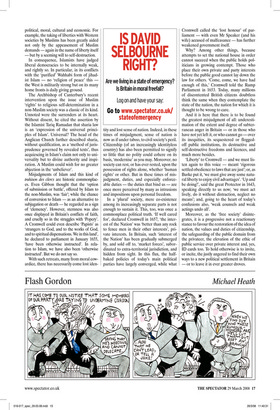IS DAVID SELBOURNE RIGHT?
Are we living in a state of emergency? Is Britain in moral freefall?
Log on and have your say:
Go to www.spectator.co.uk/ stateofemergency
tity and lost sense of nation. Indeed, in these times of misjudgment, sense of nation is now as if under taboo, to civil society’s peril. Citizenship (of an increasingly identityless country) has also been permitted to signify so little that no polity could cohere on its basis, ‘modernise’ as you may. Moreover, no society can rest, or has ever rested, upon the possession of rights alone, whether ‘human rights’ or other. But in these times of misjudgment, duties, and especially enforceable duties — the duties that bind us — are once more perceived by many as intrusions and impositions upon personal freedom.
In a ‘plural’ society, mere co-existence among its increasingly separate parts is not enough to sustain it. This, too, was once a commonplace political truth. ‘If well cared for’, declared Cromwell in 1657, ‘the interest of the Nation’ was ‘better than any rock to fence men in their other interests’, private interests. In Britain, such ‘interest of the Nation’ has been gradually submerged by, and sold off to, ‘market forces’, subordinated to extra-territorial jurisdiction, and hidden from sight. In this flux, the halfbaked policies of today’s main political parties have largely converged, while what Cromwell called the ‘lost honour’ of parliament — with even Mr Speaker (and his wife) accused of malfeasance — has further weakened government itself.
Why? Among other things, because attempts to set the national house in order cannot succeed when the public holds politicians in growing contempt. Those who place their own private and party interests before the public good cannot lay down the law for others. ‘Come, come, we have had enough of this,’ Cromwell told the Rump Parliament in 1653. Today, many millions of discontented British citizens doubtless think the same when they contemplate the state of the nation, the nation for which it is thought to be wrong to care.
And it is here that there is to be found the greatest misjudgment of all: underestimation of the extent and degree of subterranean anger in Britain — or in those who have not yet left it, or who cannot go — over its inequities, its sequestered or floggedoff public institutions, its destructive and self-destructive freedoms and licences, and much more besides.
‘Liberty’ to Cromwell — and we must listen again to this voice — meant ‘rigorous settled obedience to laws that are just’; or, as Burke put it, ‘we must give away some natural liberty to enjoy civil advantages’. ‘Up and be doing!’, said the great Protector in 1643, speaking directly to us now; ‘we must act lively, do it without distraction, neglect no means’; and, going to the heart of today’s confusions also, ‘weak counsels and weak actings undo all’.
Moreover, as the ‘free society’ disintegrates, it is a progressive not a reactionary stance to favour the restoration of the idea of nation, the values and duties of citizenship, the safeguarding of the public domain from the privateer, the elevation of the ethic of public service over private interest and, yes, ID cards too. To hold otherwise is to invite, or incite, the justly angered to find their own ways to a new political settlement in Britain — or to leave it in ever greater droves.
















































































 Previous page
Previous page